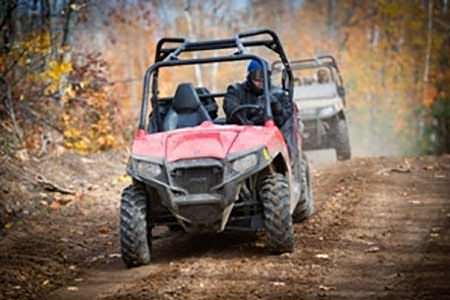
PHOENIX, Ariz. -(Ammoland.com)- When hunting for big game, off-highway vehicles (OHVs) can be a key part of how hunters retrieve downed animals. In fact, sometimes it’s the only way to retrieve a harvested elk or bison. As hunters hit the trails on OHVs like side-by-sides, it’s important to buckle up if the vehicle is equipped with seatbelt.
Numerous fatal accidents this year have involved utility task vehicles (UTVs) that roll over and pin the operator underneath. Wearing a seatbelt is critical because it will help keep the operator and any passengers inside the UTV in the event of an accident.
“You wear your seatbelt when driving a car or truck, make that habit the same for operating an OHV,” said Josh Hurst, OHV law enforcement coordinator for the Arizona Game and Fish Department. “If your off-highway vehicle is equipped with seatbelts, there’s no reason to not take the simple step of buckling up. Stay in the vehicle, stay alive.”
And if your kids are joining you on the hunt, helmets are required for all OHV operators and passengers under the age of 18 (but they’re strongly recommended for everyone).
In addition to seatbelts and helmets, there are a few other considerations to keep in mind when combining hunting and OHVs:
- It’s illegal to discharge a firearm from a motor vehicle, including OHVs.
- Ask for permission before operating an OHV on private roads and trails.
- Off-trail use on Arizona public lands is illegal, with the exception of specific areas for the retrieval of lawfully taken big-game animals. Consult with the land management agency responsible for the area to find out about the rules and regulations.
- Share the road with others whether they’re hunters on foot, OHV recreationists or anyone enjoying Arizona’s outdoors.
Any acts of vandalism or habitat destruction can be reported 24/7 to the Arizona Game and Fish Department’s 1-800-VANDALS hotline.
It’s helpful to provide a license plate number and description of both the OHV and operator as well as a location of the activity so law enforcement personnel can follow up on the information.
If the illegal taking of wildlife is witnessed, the department encourages anyone with information to report it to the Operation Game Thief hotline at 800-352-0700 or visit www.azgfd.gov/ogt. The department pays cash rewards to individuals whose reports of wildlife crimes lead to an arrest.
Get more information about OHV education and safety as well as rules and regulations on their website.
Off-Highway Vehicle and Legislation History:
The Arizona Game and Fish Department became involved with off-highway vehicle (OHV) recreation in 1972 when legislation was passed that gave the Arizona Game and Fish Commission the authority to approve and expend funds to identify habitat damage, provide information and education, and provide law enforcement for OHV-related activities. Although the authority to conduct these activities was approved, it was not until 1989 that funding was actually provided to administer these duties.
With this revenue, the Arizona Game and Fish Department funds personnel and resources to meet the department’s mission of conserving, enhancing and restoring Arizona’s diverse wildlife resources and habitats through aggressive protection and management programs, and to provide wildlife resources, safe watercraft and off-highway vehicle recreation for the enjoyment, appreciation, and use of present and future generations.
On June 27, 2008, Arizona Governor Janet Napolitano signed into law SB1167. The rules and regulations of that bill went into effect on  January 1, 2009, thanks in large part to a joint effort between Arizona Sportsmen and OHV user groups.
January 1, 2009, thanks in large part to a joint effort between Arizona Sportsmen and OHV user groups.
The goal of the new regulations is to provide better OHV management and protection of natural resources while maintaining access.
Funds generated from this program will be used to help ensure sustainable opportunities by bolstering grant programs that pay for maintenance, signage, mitigation, education and enforcement. Remember to leave no trace and that nature rules! Stay on roads and trails.
